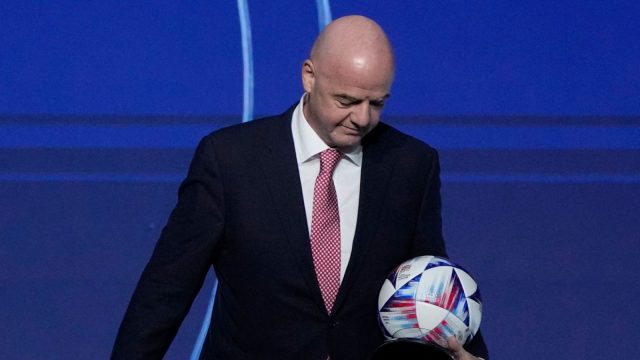The head of FIFA has threatened not to show this year’s Women’s World Cup in five European countries, including the UK, France, Germany, Italy and Spain, in a row over money.
Gianni Infantino said the current offers from broadcasters for the rights were “disappointing” and described them as a “slap in the face” of all great players and “all women worldwide”.
The president said it was the “moral and legal obligation” of football’s world governing body “not to undersell” the tournament, which will be co-hosted by Australia and New Zealand, and runs from 20 July to 20 August.
Mr Infantino said if the offers “continue not to be fair [towards women and women’s football], we will be forced not to broadcast the FIFA Women’s World Cup into the ‘Big 5’ European countries”.
He claimed broadcasters had offered FIFA between $1m (£800,000) and $10m (£8m) for the rights, compared with $100m (£80m) to $200m (£160m) for the men’s World Cup.
Mr Infantino made similar statements at FIFA’s 73rd congress last month, and has now reiterated his critique at the World Trade Organization (WTO) headquarters in Geneva.
In an Instagram post, Mr Infantino later wrote: “Today, I have repeated my call for broadcasters to pay a fair price for FIFA Women’s World Cup 2023 media rights. We did our part: FIFA has raised the prize money to $152m, treble the amount paid in 2019 and 10 times more than in 2015 (before I became FIFA president).
“However, the offers from broadcasters, mainly in the ‘Big 5’ European countries, are still very disappointing and simply not acceptable, especially considering that:
“1) 100% of any rights fees paid would go straight into women’s football, in our move to promote actions towards equal conditions and pay.
“2) Public broadcasters in particular have a duty to promote and invest in women’s sport.
“3) The viewing figures of the FIFA Women’s World Cup are 50-60% of the men’s FIFA World Cup (which in turn are the highest of any event), yet the broadcasters’ offers in the ‘Big 5’ European countries for the FIFA Women’s World Cup are 20 to 100(!) times lower than for the men’s FIFA World Cup.
“4) And concretely, whereas broadcasters pay $100-200m for the men’s FIFA World Cup, they offer only $1m-$10m for the FIFA Women’s World Cup.
“This is a slap in the face of all the great FIFA Women’s World Cup players and indeed of all women worldwide. So, to be very clear, it is our moral and legal obligation not to undersell the FIFA Women’s World Cup. Therefore, should the offers continue not to be fair (towards women and women’s football), we will be forced not to broadcast the FIFA Women’s World Cup into the ‘Big 5’ European countries.
“I call, therefore, on all players (women and men), fans, football officials, presidents, prime ministers, politicians and journalists all over the world to join us and support this call for a fair remuneration of women’s football. Women deserve it! As simple as that!”
Read more:
FIFA set to pay clubs £300m for sending players to World Cup
FIFA confirms no Saudi deal for Women’s World Cup after human rights backlash
Women’s World Cup prize money ‘to match men’s by 2027 tournament’
England, France, Germany, Italy and Spain have all qualified for the first Women’s World Cup to have 32 teams, and FIFA has a standby broadcasting option with its own online streaming platform FIFA+.
The tender process for UK broadcasting rights to the competition opened in June 2022 with a bid deadline of 12 July last year.
It followed the UK government’s April 2022 announcement that both the Women’s World Cup and UEFA Women’s Euros would be added to the Listed Events Regime, “crown jewels” sporting events that must be offered to free-to-air broadcasters, limiting potential bidders.
The PA news agency understands there are positive discussions ongoing with potential UK broadcasters, but no concrete deal has been agreed.
The 2023 tournament will also be the first Women’s World Cup to take place under FIFA’s overhauled commercial structure, announced in 2021, which for the first time “unbundled” the women’s game from the men’s, allowing brands to take up dedicated partnerships exclusively for its women’s football programmes.












![Mr Logic signs two dancehall artistes unto his Red Panther record label [Video]](https://ghananewss.com/storage/2023/05/Mr-Logic-signs--100x75.jpeg)







